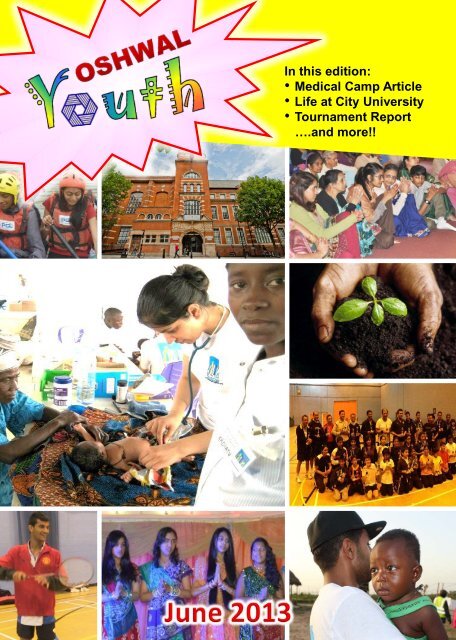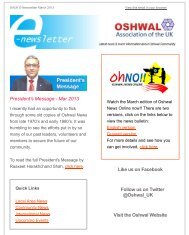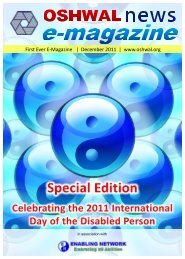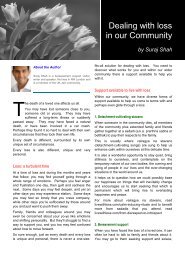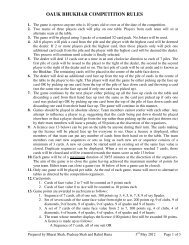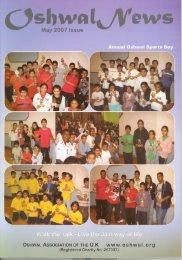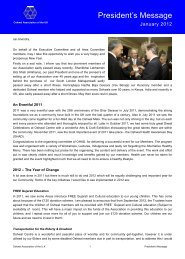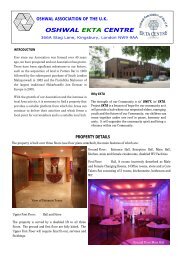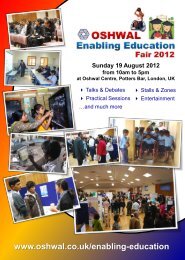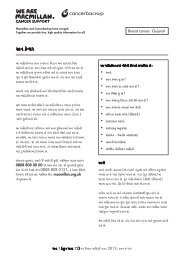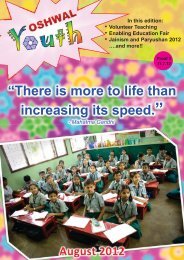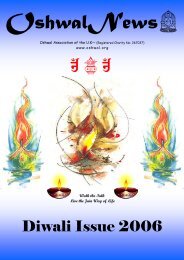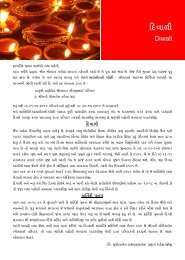June 2013 - Oshwal Centre
June 2013 - Oshwal Centre
June 2013 - Oshwal Centre
You also want an ePaper? Increase the reach of your titles
YUMPU automatically turns print PDFs into web optimized ePapers that Google loves.
In this edition:<br />
• Medical Camp Article<br />
• Life at City University<br />
• Tournament Report<br />
….and more!!
Editorial<br />
Ashish Jayantilal Patani<br />
Good Luck!!<br />
For those undertaking exams in <strong>June</strong>/July – wishing you<br />
the very best of luck. Study hard, revise harder and<br />
remember then you can chill and play the hardest!!<br />
After exams!<br />
So, what are your plans after your exams are finished? A<br />
summer of relaxation and travels? Or summer jobs and<br />
internships? Remember a balance of activities is<br />
important so be sure to blend in some travels and fun<br />
stuff with a summer job or internship. That will help your<br />
CV for when it comes to finding a full time job. Also, if<br />
your parents have a family business, go help out in the<br />
shop or the office! It will be valuable experience. Listen to<br />
what they can teach you, but don’t be afraid of teaching<br />
them a few new tricks from what you have learnt at<br />
school, college or university.<br />
Exploring yourself this Summer<br />
explore a new activity which you may have always<br />
wanted to do but never somehow found the time to do.<br />
Whether it is to try a new sport, a new hobbit, go sky<br />
diving, learning to drive…life is too short, so go out and<br />
just do it!!<br />
Ask them out!<br />
And for those of who are looking for a special partner the<br />
same applies to you! Life is really too short to be caught<br />
up in ‘what ifs’ and ‘buts’. If there is someone you like or<br />
have seen and would like to know better – just go and tell<br />
them! The worse that can happen is they is they will say<br />
no, but at least you’ll stop wondering and who knows<br />
maybe they will say yes and it could be the start of<br />
something great!!<br />
So this summer, live by the simple motto…live, laugh<br />
and love!!!<br />
Have a great summer and take care everyone,<br />
Ashish Patani<br />
For those of you who are slightly older and settled in your<br />
first jobs since university, perhaps this summer you can<br />
Contents<br />
Sierra Leone Medical Camp 4 Racquet Sports Tournament 10<br />
Interview with Kavita Shah 6 Tigers 12<br />
Life at City University 7 Samayik 13<br />
London <strong>Oshwal</strong> Youth 8 Word Search 14<br />
Disclaimer Notice:<br />
The Editor nor <strong>Oshwal</strong> Association of the U.K. is not in anyway responsible for the goods and services<br />
rendered by its Advertisers. The <strong>Oshwal</strong> Association of the U.K. accepts all advertisements in good faith and it<br />
is entirely up to readers to verify Advertisers products and services should they feel the need to do so.<br />
OSHWAL NEWS & OSHWAL YOUTH are magazines of the OSHWAL ASSOCIATION OF THE U.K.<br />
© : <strong>Oshwal</strong> Association of the U.K. | Reg. Office: Coopers Lane Road, Northaw, Herts. EN6 4DG | Registered<br />
in accordance with the Charities Act 1960 | Charity Reg. No. 267037
Get involved!<br />
Here is a short summary of the various activities with which you can get involved. They are a great way to<br />
learn new things, gain new skills and make new friends.<br />
London <strong>Oshwal</strong> Youth<br />
Check out the report on the last London <strong>Oshwal</strong> event on page 8. These events in<br />
Central London are run by the youth for the youth – strictly no oldies!! The aim is<br />
to learn a few new skills, have fun and meet new people.<br />
If you would like to join the Team or have ideas for future events, or for more details,<br />
please get in touch with:<br />
Ashish – ashish.patani@oshwal.org or Anjali – anjali.gudhka@oshwal.org<br />
Media Team<br />
If you are an aspiring writer, graphic designer, movie director or just wanted to do<br />
something creative, the <strong>Oshwal</strong> Media and Communications Team could be just the<br />
place for you!<br />
Also remember if you are studying Media studies or want to get into the media<br />
industry, this could be a great way to build your media work portfolio. We are looking<br />
for people to join the team, so get in touch with the M&C team now:<br />
Ashish – ashish.patani@oshwal.org or Bini – bini.chandaria@oshwal.org<br />
‘University Life’ E-magazine – articles needed<br />
At university? About to go or just left? Then we need you!<br />
One of the upcoming projects that the Media Team is doing is an E-magazine with the<br />
theme of ‘University Life’. Tell us about how great your university and your course are,<br />
what worries you most about going to university or the most difficult thing you found<br />
about being at university, or anything else you would like to share about your<br />
university experience.<br />
For more info get in touch with the M&C team – oshwalweb@oshwal.org<br />
Sewa & Environment Team<br />
Introducing one of newest teams – the Sewa and Environment team! A new group has<br />
been formed to look at how as a community we can help those less fortunate than<br />
ourselves and how we can help protect the environment.<br />
If you are interested in sharing your ideas or joining the team, please contact:<br />
Bini – bini.chandaria@oshwal.org<br />
Special Note<br />
For those who are <strong>Oshwal</strong> Members and under 18 years of age, if you take part in the above<br />
activities, we can provide you with Volunteer Certifications to confirm your voluntary work. This<br />
can be very helpful for your CV in the long-term. Note T&C apply. For more details, contact the<br />
relevant people for the activities above.<br />
And finally…<br />
If you have other skills or other ideas for things you would like to do, that don’t fit in with the list<br />
above, get in touch. We are always willing to listen to new ideas – please contact Ashish –<br />
ashish.patani@oshwal.org<br />
<strong>Oshwal</strong> Youth Magazine of O.A.U.K. 3 <strong>June</strong> <strong>2013</strong> Edition
Sierra Leone<br />
Medical Camp<br />
Article by Sachin Shah<br />
SIERRA LEONE – MAY 2012 - It all started when I<br />
was sitting on a beach in Cambodia and I received<br />
an email from a friend about volunteering at a<br />
medical camp in Sierra Leone. The charity<br />
organising the trip, Better Lives Foundation, run<br />
three medical camps a year in a small purpose built<br />
hospital in Yonibana, 88 miles from the capital,<br />
Freetown. They were reaching out for pharmacists<br />
and other medical professionals, who were<br />
interested in going to Sierra Leone to volunteer in<br />
one of their medical camps. As a newly qualified<br />
pharmacist, I thought this would be a great<br />
opportunity to use my skills and give something<br />
back to the less fortunate.<br />
When agreeing to go on this trip, I didn’t know much<br />
about the charity, the medical camp or what I was<br />
going to do out there. Fortunately, the charity<br />
arranged a pre-camp meeting a month before we<br />
were set out to fly to Sierra Leone. This gave me a<br />
chance to learn more about the camp and meet<br />
some of the doctors, pharmacists, nurses and<br />
volunteers that I would be working with.<br />
To give a bit of background, Sierra Leone is located<br />
on the West Coast of Africa with a population of<br />
5.5million; it is roughly the same size as Scotland!<br />
Around 60% of the population live on less than a<br />
dollar a day and the country only has about 150<br />
doctors in total. Sierra Leone is one of the poorest<br />
countries in Africa in terms of infrastructure. It has<br />
been devastated by 10 years of civil war that only<br />
finished a decade ago. Electricity is scarce and<br />
there is virtually no clean water. Life expectancy<br />
stands at a shocking 42 years.<br />
Being a newly qualified pharmacist, I was worried<br />
that I would be completely out of my depth. I<br />
therefore did as much research as possible on some<br />
of the medical conditions and diseases (e.g.<br />
Malaria) that are commonly found in West Africa and<br />
the procedures for treatment.<br />
The day finally arrived for me to go to Heathrow<br />
airport with my little trolley bag and meet the other<br />
24 volunteers (including doctors, pharmacists,<br />
nurses, GPs, medical students, engineers, I.T.<br />
technicians and general assistants). I was both<br />
excited and nervous, not knowing what to expect on<br />
this once in a lifetime experience. We were not<br />
allowed to take suitcases as our weight allowance<br />
was used to transport medical supplies, food,<br />
clothes, books and equipment.<br />
After a 7 hour flight, we<br />
arrived in the capital,<br />
Freetown and then had<br />
a long, bumpy coach<br />
ride to the Yonibana Sai<br />
Hospital. Yonibana Sai<br />
Hospital is a permanent<br />
base hospital that has a<br />
guest-house for<br />
volunteers. The guesthouse<br />
was constructed<br />
in 2008 and the rooms<br />
were basic, each with 3<br />
or 4 mattresses on the<br />
floor.<br />
The next morning we<br />
woke up at 6am. After a<br />
cold shower and some breakfast we walked into the<br />
hospital to start unpacking and preparing for the<br />
medical camp. The hospital was only partially open<br />
on this day but there were still queues of people<br />
waiting outside for treatment. We were then<br />
introduced to the local volunteers, who are being<br />
funded by Better Lives Foundation to become<br />
qualified nurses and health-care assistants. I was<br />
buzzing with energy and could not wait to see how I<br />
could help these people.<br />
We unpacked all the medical supplies and began<br />
setting up the pharmacy and other medical rooms.<br />
We could see the urgent need for the medication as<br />
<strong>Oshwal</strong> Youth Magazine of O.A.U.K. 4 <strong>June</strong> <strong>2013</strong> Edition
~ Sierra Leone Medical Camp ~<br />
doctors were giving us prescriptions before we were<br />
even ready for them.<br />
As lunchtime approached, the sun was rising and it<br />
was becoming very hot and humid. We were very<br />
lucky to be given delicious meals that were cooked<br />
by the local volunteers and general volunteers from<br />
London, which included shak rotli, rice and dhal,<br />
pasta and soups. As soon as lunch was eaten we<br />
were back in the hospital, there was always<br />
something that needed to be done or someone that<br />
needed help.<br />
My job was to not only be in the pharmacy<br />
dispensary but also assist the various doctors in<br />
seeing patients, measuring blood pressure and<br />
testing children for Malaria. We came across so<br />
many malnourished babies in the hospital, where we<br />
began treatment with Oral Rehydration Salts. For<br />
one patient who was due to undergo surgery, I even<br />
had to formulate intravenous antibiotics. There was<br />
one occasion, where we went for a walk and came<br />
across a group of children playing, one of whom had<br />
fractured his arm. Being poor, his family could not<br />
afford for him to see a doctor so we took him back to<br />
this hospital to plaster cast his arm.<br />
It was inspirational to see the volume of patients<br />
who were suffering from various, life-threatening<br />
illnesses. They never complained, kept smiling and<br />
continued with their day-to-day lives. Even as the<br />
days became longer and more tiring as they went<br />
on, we were still ready as ever each morning to help<br />
the people of Sierra Leone. It was a pleasure to treat<br />
the patients and to also work with, and learn from<br />
the other healthcare professionals.<br />
My goal was to go to Sierra Leone to try and help<br />
find and implement life-saving solutions for the<br />
patients. I saw first-hand how the treatment made a<br />
difference to the patients and as a result, the<br />
patients were very appreciative towards us. This<br />
gave us the motivation to work together in often<br />
emotionally demanding situations where there were<br />
very limited resources.<br />
I couldn’t believe how fast our time went in Sierra<br />
Leone. On our last day, we left Yonibana early in the<br />
morning and drove to Freetown where we spent the<br />
afternoon looking around in the town and walking on<br />
the beach, before we got on our flight back to reality,<br />
back to life in London.<br />
In the space of just 8 days we saw over 3000<br />
patients whilst working in the hospital. Some of<br />
these patients had come from neighbouring villages,<br />
whilst others had travelled 88 miles from Freetown.<br />
They queued for hours in the heat without any<br />
complaints, just to have some time with a healthcare<br />
professional.<br />
My experience from Sierra Leone made me realise<br />
how fortunate I am to live in a house with such<br />
‘basic’ amenities like hot water and fresh food. The<br />
people of Yonibana had so little yet lived so happily.<br />
Reflecting back on the trip I am thankful to have met<br />
so many wonderful and inspirational people; not only<br />
the doctors and nurses but the courageous people<br />
of Sierra Leone. I would like to thank Better Lives<br />
Foundation for giving me the opportunity of going<br />
out there to give something back. It was definitely<br />
rewarding and is something I would recommend to<br />
anyone.<br />
<strong>Oshwal</strong> Youth Magazine of O.A.U.K. 5 <strong>June</strong> <strong>2013</strong> Edition
Kavita Shah, 27, is a Natural<br />
Health (North Finchley)<br />
Nutritionist, having studied BSc<br />
Nutrition at University of<br />
Nottingham and MSc Nutrition<br />
at King’s College London. She<br />
has been involved in a range of<br />
voluntary work within Harrow.<br />
Let’s hear what Kavita says<br />
about her voluntary work.<br />
Interview with<br />
Kavita Shah<br />
Harrow Heroes Award<br />
How did you get involved in volunteer work?<br />
While looking for work in 2010, I contacted the<br />
Nutritionist who works for the NHS Harrow Public<br />
Health team and she got me involved in the work<br />
that they do which involves helping to set up and run<br />
Cook & Eat sessions and Healthy Eating<br />
Workshops, providing nutritional support for families<br />
and providing staff training within the 16 Children’s<br />
<strong>Centre</strong>s in Harrow.<br />
What has been the best bit about working at<br />
Children’s <strong>Centre</strong>s in Harrow?<br />
Being able to make a difference to people’s health<br />
and wellbeing. Meeting new people and working<br />
with children.<br />
How did it feel to win the 2012 Harrow Heroes<br />
Award?<br />
I didn’t even know I had been nominated for the<br />
award so when I received the invite to the awards<br />
ceremony I was quite surprised. I felt very pleased<br />
and honoured to have won the award and I think it is<br />
fantastic that volunteers are shown appreciation with<br />
such awards.<br />
How can someone get involved in the volunteer<br />
work you do?<br />
They can contact me directly (you can provide my<br />
email address kavita-shah@hotmail.co.uk) or they<br />
can contact Lauren Hayes- Public Health Officer<br />
NHS Harrow (lauren.hayes@harrow.gov.uk)<br />
What advise / tips / guidance would you give to<br />
people to help understand the importance of<br />
healthy eating?<br />
Everything in moderation! Try and eat fruit and<br />
vegetables raw, as cooking / heating foods destroys<br />
many of their vital nutrients. Avoid eating deep fried<br />
foods which contain saturated fat as this type of fat<br />
increases the cholesterol in our blood and high<br />
levels of blood cholesterol increase our risk of heart<br />
disease and stroke. Exercise is also very important<br />
in maintaining a healthy lifestyle. As little as 20<br />
minutes of walking a day can have benefits to your<br />
health.<br />
What would you like to see happen with regards<br />
to the Children’s <strong>Centre</strong>s in Harrow? i.e. what<br />
additional resources / support is required?<br />
Additional funding to help staff set up cooking/<br />
healthy eating workshops is always required.<br />
What would you like to see happen in terms of<br />
health and wellbeing within the <strong>Oshwal</strong><br />
community?<br />
A reduction in type 2 diabetes which is very common<br />
in the <strong>Oshwal</strong> Community. Also for the community to<br />
understand the importance of uncontrolled type 2<br />
diabetes, as in the long term this can lead to a<br />
variety of other health complications.<br />
Tell us about your experience<br />
If you or someone you know does voluntary work<br />
outside of our community, we would like to hear<br />
from you. Email us at oshwalnews@oshwal.org.<br />
<strong>Oshwal</strong> Youth Magazine of O.A.U.K. 6 <strong>June</strong> <strong>2013</strong> Edition
Life at City<br />
University<br />
Article by Aarti Rumeet Shah<br />
U<br />
niversity life has proven to be one of the most<br />
enjoyable times of my life. I’m a firm believer of<br />
pursuing things in life which you enjoy and help<br />
you grow as a person - this was one of the key reasons<br />
why I chose to study Mathematics.<br />
Why did I choose City?<br />
I knew that whatever I decided to do, that my parents and family<br />
would always be there to guide and support me. I was<br />
recommended City by both family and friends who had studied<br />
there. I also attended a few Open Days, both general and<br />
mathematical ones, to gain a better insight of the university.<br />
Aside from my choice of degree, one of the other aspects of City<br />
I had researched was what different activities the university had<br />
to offer. After speaking to a few current students at the Open<br />
Days, I decided that this was one university I definitely wanted<br />
to apply to.<br />
Student life at City<br />
City University offers a range of courses, from Business,<br />
Engineering, Law, Management and Mathematics through to the<br />
medical related degrees such as Midwifery and Optometry.<br />
Each course varies from the next, so it is goes without saying<br />
that you should to do a bit of research before you apply for your<br />
chosen course. Speaking to current students during the<br />
University’s Open Days is useful. This will give you an insight<br />
into what it would be like to study your course at City.<br />
Being in the heart of London, means that students are close to<br />
the capital’s leading financial, legal, media and medical<br />
institutions. Both professionally and personally, you will have the<br />
opportunity to benefit from all that London has to offer.<br />
There are numerous opportunities for volunteering at City, a<br />
great way to help others, while developing your skills for your<br />
future career. In my second year, I became a student<br />
ambassador for the University. This involved engaging with<br />
young people and employers in the local community – this is<br />
great for personal development and a bonus for your CV!<br />
Unlike many other universities, for many of its’ degree courses,<br />
City University offers its’ students Sandwich courses, where<br />
students get the opportunity after their second year, to work for<br />
a year in an industry relating to their degree. I saw this as a<br />
great opportunity to use everything I had learnt from my degree<br />
and apply it to the real world. My year in industry was fantastic.<br />
Aside from the gruelling hours and the immense workload, I<br />
found I was able to incorporate my degree into my daily life. The<br />
experience was invaluable, and I am glad that I did not let this<br />
opportunity pass me by. Work experience is key, for whatever<br />
your chosen field - it puts you one step ahead of many other<br />
applicants who may not have the required experience, and may<br />
even secure you the job!<br />
Sport at City<br />
If you enjoy a particular sport, you can join one of the many<br />
sports teams at City. Many of the sports teams compete in the<br />
British Universities & Colleges Sport (BUCS) and London<br />
University Sports League (LUSL), and they also compete<br />
against teams from other universities on Wednesday<br />
afternoons. As well as playing a sport you love, you also have<br />
the opportunity to meet many different people!<br />
Societies and Clubs at City<br />
City University not only offers the academic side, but also offers<br />
a diverse range of extracurricular clubs and societies you may<br />
join in; covering a wide range of social, academic, political,<br />
sporting and cultural interests. Attending Freshers’ events in the<br />
first two weeks of university is a definite must. This will give you<br />
the chance to interact with other students and is an opportunity<br />
to make new friends, as well as joining different societies.<br />
City’s Careers and Skills Development Service<br />
The Career and Skills Development Service is great at City. It<br />
regularly hosts panel events, giving students the chance to<br />
investigate the career options available to them. Each event<br />
consists of a series of talks followed by a networking reception<br />
with employers and recent graduates.<br />
From going to school...to attending university<br />
– what was it like?<br />
The first few weeks can be daunting. I found that the hardest<br />
thing to adjust to was the atmosphere of university life. The<br />
working environment is totally different! There is plenty of<br />
freedom, and it is your personal responsibility that your work is<br />
completed and submitted on time. You may find the transition to<br />
university life particularly difficult, but remember that you are not<br />
alone - majority of the other students on your course will be in<br />
the same boat! ...Before you know it, you’ll be asking yourself<br />
what all the worrying was all about!<br />
Key Point: Go to the open days. Speak to the<br />
students. Who knows? City might just be the perfect<br />
university for you!<br />
<strong>Oshwal</strong> Youth Magazine of O.A.U.K. 7 <strong>June</strong> <strong>2013</strong> Edition
London <strong>Oshwal</strong><br />
Youth<br />
Invest in Africa Evening<br />
CENTRAL LONDON – THURSDAY 28 MARCH<br />
<strong>2013</strong> – The London <strong>Oshwal</strong> Youth team is an idea<br />
inspired from last year's Enterprise Programme,<br />
where UK university students went to Kenya to see<br />
a host of different businesses and industries.<br />
Thereafter there were suggestions of hosting regular<br />
events for the youth by the youth in Central London<br />
locations. With this in mind, the first event was held<br />
back in November 2012, called ‘An Enterprise<br />
Evening’. Following on from the success of this<br />
event, the 2012 Enterprise Programme students<br />
helped organised a second event on Thursday 28<br />
March <strong>2013</strong>, at Grand Connaught Room, Great<br />
Queen’s Street, WC2B 5DA. This time the theme<br />
was “Invest in Africa.”<br />
Importance of negotiation skills<br />
After a short welcome and introductions, Bhavik<br />
Jayendrakumar Shah, Co-founder and Director at<br />
Niveda Group gave a short talk on the importance of<br />
negotiation skills. Bhavik drew upon his own work<br />
experiences to outline some key tips about<br />
negotiations.<br />
CV Tip<br />
A key CV tip Bhavik<br />
outlined was that<br />
"Negotiation skills<br />
are of utmost<br />
importance to<br />
prospective<br />
employers, yet the<br />
least seen on CVs<br />
of prospective<br />
candidates." The<br />
reason is because<br />
negotiation skills<br />
are associated with<br />
decision makers of<br />
an organisation, who would normally be the<br />
senior/higher level members of the management.<br />
However, employers looking at the longer term<br />
potential of a candidate would like to see the<br />
candidate possessing negotiation skills from the<br />
early stages in order to be able to progress over<br />
time.<br />
What is Negotiation?<br />
Furthermore, Bhavik mentioned “often negotiation is<br />
defined incorrectly as reaching agreement, getting<br />
the best deal, or resolving a point of difference. It<br />
should be noted that negotiation is a 'process' and<br />
not a 'result'; it is an 'intention', not the 'outcome'.<br />
Successful negotiation is where the intended<br />
outcome is achieved. This helps distinguish<br />
successful negotiation from unsuccessful<br />
negotiation.”<br />
Obstacles to successful negotiations<br />
Bhavik went on to outline the main obstacles to<br />
achieving successful negotiations in Africa as<br />
follows:<br />
a) Limited access to accurate and reliable<br />
information.<br />
b) Limited mediums of communication and<br />
language barriers in some countries.<br />
c) Differences in cultures, ethnicities and tribalism.<br />
d) Poor financial services sector that restricts the<br />
scope to perform efficient transactions.<br />
e) Corruption and bureaucracy within the public<br />
and private sector.<br />
f) Low levels of skills and expertise of decision<br />
makers in some organisations.<br />
Bhavik then concluded that “these obstacles also<br />
present opportunity for investment purposes as<br />
entities (individuals or companies) that possess<br />
unique advantages within the business environment<br />
can capitalise on them comfortably with little<br />
competition.”<br />
<strong>Oshwal</strong> Youth Magazine of O.A.U.K. 8 <strong>June</strong> <strong>2013</strong> Edition
Business negotiation game<br />
After Bhavik’s talk, everyone was split into five<br />
teams and briefed on the Business Negotiation<br />
Game. Essentially, everyone had to take on the role<br />
of budding investment analysts who had to research<br />
five African countries and make recommendations<br />
on an investment strategy to invest £100 million.<br />
Everyone had to work in teams to come up with a<br />
winning investment strategy pitch to be presented.<br />
The five countries were Ghana, Kenya, Nigeria,<br />
Tanzania and Uganda – but each team were only<br />
provided with information for three<br />
countries. In order to obtain<br />
information about the other two<br />
countries, teams had buy and sell<br />
the information between each other<br />
at a price which they negotiated.<br />
Each team was given a budget of<br />
£1,000 and they had to negotiate a<br />
price for each piece of information<br />
between £50 and £250. All teams<br />
were give specially issued bank<br />
notes issued by the Bank of<br />
<strong>Oshwal</strong>!!<br />
Teams had about 45 minutes to<br />
negotiate the purchase or selling of<br />
the information and come up with a<br />
winning investment strategy, which<br />
had to take into consideration all five countries.<br />
Teams engaged in an exciting round of negotiations<br />
and also were presented with a special edition of<br />
<strong>Oshwal</strong> News Online Business bulletin, which<br />
outlined some key developments in the five<br />
countries.<br />
Thereafter, each team prepared and presented their<br />
investment strategy to the “Dragons” (aka the 2012<br />
Enterprise Programme students - Aarti Rumeet<br />
Shah, Dhruman Piyush Shah, Priya Rajesh Shah,<br />
Rahul Jatish Malde). Teams also had an opportunity<br />
to ask questions on each other's presentations.<br />
<strong>Oshwal</strong> Business & Professional<br />
Network (OBPN)<br />
A brief highlight of the OBPN was provided, an<br />
initiative seeking to create and maintain a support<br />
structure for all <strong>Oshwal</strong> members, specifically in<br />
areas of mentoring, career guidance, recruitment,<br />
business helpline, work experience, internships,<br />
personal development, post work-life activities, etc.<br />
This will develop, harness and increase the overall<br />
~ London <strong>Oshwal</strong> Youth ~<br />
wealth and intellectual capital of our community in<br />
the UK and globally.<br />
Youth & university co-ordinator<br />
Anjali Gudhka is the Youth and University Coordinator<br />
and outlined some of her thoughts about<br />
Youth involvement within the <strong>Oshwal</strong> community,<br />
outlining initiatives like university ambassadors and<br />
inclusive sports.<br />
Board of Advisors<br />
Minesh Kirtikumar Shah, is the<br />
youngest elected member of the<br />
Board of Advisors, and gave a<br />
short talk on getting more youth<br />
involved in the community. Minesh<br />
mentioned that "the Enterprise<br />
evening was another shining<br />
example of the depth of talent in<br />
our community. An insightful<br />
evening focusing on the skills<br />
required for a successful<br />
negotiation, organised by the 2012<br />
Enterprise students and including a<br />
presentation from Bhavik J Shah,<br />
and was thoroughly enjoyed by all.<br />
The evening gave everyone an<br />
opportunity to reconnect with old<br />
friends and make new ones."<br />
Future events<br />
Overall, feedback from the event has been excellent<br />
and very positive, and we are looking to host more<br />
events in Central London. If you have ideas and<br />
thoughts of the type of event you would like to see,<br />
or would like to join the London <strong>Oshwal</strong> Youth team,<br />
please get in touch with us.<br />
Contact details<br />
Ashish Patani – ashish.patani@oshwal.org<br />
Anjali Gudhka – anjali.gudhka@oshwal.org<br />
Or visit the <strong>Oshwal</strong> website:<br />
www.oshwal.co.uk/london<br />
<strong>Oshwal</strong> Youth Magazine of O.A.U.K. 9 <strong>June</strong> <strong>2013</strong> Edition
Racquet Sports<br />
Tournament<br />
The <strong>Oshwal</strong> Youth Committee hosted a very successful Racquet<br />
Sports Tournament on Sunday 21st April at the Harrow Leisure<br />
<strong>Centre</strong>.<br />
With nearly 200 participants in total playing Table tennis, badminton<br />
and squash, the day was full of challenges not only for the participants<br />
but also for the organisers. The talent shown by players of all ages,<br />
especially those under 21 years of age was incredible and a great<br />
source of pride for our community.<br />
Badminton players were fully stretched to their limits as they played in<br />
their pools before advancing to the knockout stage. It was especially<br />
great to see so many ladies participating and everyone thoroughly<br />
enjoyed themselves.<br />
Squash saw some very intense games amongst the men with a very<br />
high standard of technique and skill. Although the younger age groups<br />
and the ladies categories were not very well represented, the<br />
individuals who did play showed great talent and potential.<br />
Table tennis saw some fantastic battles with the ball flying back forth<br />
at incredible speeds. The skills demonstrated in keeping the ball within<br />
the confines of the table and also the agility of the players in getting<br />
most shots back was truly inspiring to watch.<br />
All in all, the day was full of fun, challenges, competitiveness, great<br />
sportsmanship as well as nurturing social relations amongst players of<br />
various ages!<br />
The youth committee would like to specially thank all the participants<br />
who took up the challenge and to all the volunteers and helpers on the<br />
day.<br />
Badminton Prize Winner<br />
(Ricky Shah (R) – Squash<br />
Men’s Winner)<br />
(Table Tennis Prize<br />
Winners)<br />
<strong>Oshwal</strong> Youth Magazine of O.A.U.K. 10 <strong>June</strong> <strong>2013</strong> Edition
~ Racquet Sports Tournament ~<br />
Congratulations to the finalists for all the categories. The finalists are listed below for all the categories:<br />
BADMINTON<br />
EVENT WINNER RUNNER - UP<br />
BOYS U12 SINGLES Aaryan Haria Chaand Shah<br />
GIRLS U12 SINGLES Neha Shah Shaina Shah<br />
BOYS U12 DOUBLES Chaand Shah / Rohan Shah Anish Doshi / Aaryan Haria<br />
GIRLS U12 DOUBLES Symran Shah / Shaina Shah Neha Shah / Maya Shah<br />
BOYS U16 SINGLES Dillon Malde Punit Shah<br />
GIRLS U16 SINGLES Keya Amit Patani Jaina Shah<br />
BOYS U16 DOUBLES Punit Shah / Nirav Shah Meer Shah / Rahil Haria<br />
GIRLS U16 DOUBLES Darshi Shah / Ashni Shah Anjali Shah / Devina Shah<br />
BOYS U21 SINGLES Neil Malde Nirav Shah<br />
OPEN MENS SINGLES Neil Shah Khilan Shah<br />
OPEN LADIES SINGLES Keya Patani Anjali Gudhka<br />
OPEN MENS DOUBLES Nishil Shah / Jinesh Shah Mahendra Nagda / Punil Shah<br />
OPEN LADIES DOUBLES Neena Shah / Ridhi Shah Neena Patel / Rianka Shah<br />
OPEN MIXED DOUBLES Keya Patani / Amit Patani Jinesh Shah / Neena Patel<br />
VETERANS MENS SINGLES (45+) Kiran Shah Narendra Shah<br />
VETERANS MENS DOUBLES (45+) Mahendra Nagda / Punil Shah Nitin Shah / Pradip Shah<br />
TABLE TENNIS<br />
EVENT WINNER RUNNER - UP<br />
BOYS U12 SINGLES Nikhil Shah Akash Shah<br />
GIRLS U12 SINGLES Bhavini M Shah Tusli Sunil Shah<br />
BOYS U12 DOUBLES Rithik Popat / Rahil shah Rohan Shah / Sayam Shah<br />
BOYS U16 SINGLES Tej Shah Kush Shah<br />
BOYS U16 DOUBLES Kush Shah / Sarit Shah Akash Shah / Jaimin Shah<br />
BOYS U21 SINGLES Vishal Malde Tej Shah<br />
OPEN MENS SINGLES Miren Shah Sanjay Shah<br />
OPEN LADIES SINGLES Heena Shah Purvi Shah<br />
OPEN MENS DOUBLES Darshan Shah / Miren Shah Nimit Shah / Savan Shah<br />
VETERANS MENS SINGLES (45+) Mahesh Shah Anuj Shah<br />
SQUASH<br />
EVENT WINNER RUNNER - UP<br />
OPEN MENS SINGLES Ricky Shah Ronak Shah<br />
OPEN LADIES SINGLES Rupal Shah Anya Malde<br />
<strong>Oshwal</strong> Youth Magazine of O.A.U.K. 11 <strong>June</strong> <strong>2013</strong> Edition
Tigers<br />
By Meera Shah<br />
Author’s Note<br />
The below information is taken from a briefing pack issued to<br />
volunteers at the recent Tiger Tracks event held in London.<br />
Tigers are often described as majestic, dangerous and<br />
beautiful. Sadly though, these words do not reflect the<br />
current state of play with global wild tiger populations.<br />
Dangerous as they may be, wild tigers are actually<br />
endangered.<br />
What is the problem?<br />
In 1900, over 150,000 tigers roamed across 25 countries.<br />
Today, fewer than 3,500 remain and are found in only 13<br />
Asian countries. This represents a 97% decline and the<br />
extinction of three sub-species since the 1900s. The<br />
greatest population of tigers is in India.<br />
Why does this problem exist?<br />
1. Human encroachment<br />
The rapidly growing human population in many tiger<br />
range countries means that tigers are in direct<br />
competition for diminishing forest resources. Livestock<br />
and agriculture are shrinking tiger habitat fast, and their<br />
prey is poached by people living alongside tiger habitat.<br />
2. Poaching<br />
Tigers are illegally killed for their body parts, used for<br />
home decor, medicines and tonics. In some countries,<br />
tigers are farmed for their body parts. There are more<br />
tigers held in such farms, than exist in the wild the world<br />
over.<br />
3. Pollution<br />
In parks visited by tourists, tigers often ingest various<br />
forms of rubbish left behind by the visitors. Although this<br />
may not always be fatal, the long-term health and vitality<br />
of these remaining populations is severely threatened by<br />
this.<br />
Why should we save tigers?<br />
As top predators, tigers play a vital role in the ecosystems<br />
in which they live. The presence of a healthy population<br />
of tigers indicates healthy ecosystems. Conversely, if we<br />
lose tigers from the wild, ecosystems in those regions<br />
would suffer immensely. Where tigers are protected in<br />
parks, they provide a great source of employment and<br />
income for the tourist industry. The loss of tigers can<br />
therefore have a wide-ranging impact on livelihoods in<br />
these regions.<br />
Moreover, tigers have roamed the Earth for millions of<br />
years. It is our moral responsibility not to lose them, for<br />
ourselves as well as the generations to come.<br />
What can you do about it?<br />
1. Awareness<br />
Information is power. There are plenty of resources<br />
available on tiger conservation (see below). It is equally<br />
important to spread the message about tiger<br />
conservation. Claims of health benefits of tiger bone, etc<br />
are unfounded and have no scientific proof. Often the use<br />
of tiger body parts is connected with the killing of these<br />
animals or the devastation it causes within local<br />
ecosystems and communities.<br />
2. Shop wisely<br />
Don’t buy tiger products but buy forest friendly products.<br />
3. Donate<br />
There are various organisations that work to protect wild<br />
tiger populations. Below are some, in no particular order.<br />
WWF:<br />
wwf.panda.org/what_we_do/endangered_species/tigers/<br />
Environmental Investigation Agency: http://www.eiainternational.org/our-work/environmental-crime-andgovernance/illegal-wildlife-trade/tigers<br />
Save Wild Tigers: http://www.savewildtigers.org/<br />
Born Free: http://www.bornfree.org.uk/animals/tigers/<br />
4. Volunteer<br />
These organisations are often small and need help in<br />
their day to day running.<br />
5. Contact your local representatives<br />
Sometimes all it needs are the right people in the right<br />
place enforcing tiger protection with the right tools. Ask<br />
your local representatives to push for global treaties to<br />
protect the wild and where they are not, to introduce trade<br />
restrictions.<br />
Saving the tiger is a huge, complex but achievable<br />
undertaking, involving national and state governments,<br />
corporations, wildlife departments, international NGOs,<br />
grass roots organisations and local people.<br />
<strong>Oshwal</strong> Youth Magazine of O.A.U.K. 12 <strong>June</strong> <strong>2013</strong> Edition
Samayik is one of the most important ritual practices of Jainism during which we<br />
try to come closer to our soul. During samayik, we sit down in one place for fortyeight<br />
minutes isolating ourselves from our daily household, social, business, or<br />
school activities. In this time, we read religious books, pray, worship, recite navkar<br />
mantra using mara (string of beads), or do meditation. Before starting samayik,<br />
we remove our regular clothes and wear simple, but clean white cotton clothes<br />
which are reserved for samayik. We do not wear silk clothes or any leather<br />
articles which involve much violence to bugs or animals. White is the symbol of<br />
purity and calmness and that reminds us that we should stay pure and calm.<br />
Some of the items we need during samayik are an asan, muhapati, rajoharan,<br />
ghadi, anupurvi, mara and religious books that will help us to carry out some<br />
religious activities. After cleaning the ground with rajoharan, the asan is spread to<br />
sit. A muhapati is used to cover the mouth. Some people tie it to cover their<br />
mouth, while others hold it in their hand and use it to cover their mouth while<br />
speaking. A muhapati prevents small organisms from entering the mouth. It also<br />
becomes a buffer so that force of our voice and the hot air from our mouths would<br />
not kill many air beings. A muhapati also prevents spit falling on books. It also<br />
serves as a reminder to us that we should control what we say to others. A<br />
rajoharan is a kind of broom made of fine cotton or woolen threads used to clean<br />
the floor, and also to keep away the bugs coming towards us, so that they do not<br />
get hurt. If, for some reason someone has to walk during the samayik then the<br />
rajoharan is used to wipe the floor so that no bugs are crushed. A ghadi is a type<br />
of hourglass which helps us to know the time has reached 48 minutes. During the<br />
samayik some people read religious books, while others may recite Navkar<br />
mantra with mara or with the help of anupurvi or some may do meditation.<br />
During samayik, we should not talk or think of anything that involves any level of<br />
violence. Therefore, before starting the samayik we should stop our business<br />
activities, family affairs, and other matters, so that we do not get disturbed. We<br />
should inform our friends and family members to leave us alone from these<br />
matters during this time. During the samayik we should not discuss, read or talk<br />
about sensual things, or things related to worldly matters. During the samayik, our<br />
movements also should be limited so that we can observe ahimsa (non-violence)<br />
more easily. We should select a quiet, isolated place so that we are not disturbed<br />
by events going on around us. Because of such a detached atmosphere, and<br />
since we do not get involved in any worldly things for 48 minutes of samayik, we<br />
are like sadhus who live a detached life all throughout their life. Thus, this practice<br />
gives us some glimpse of monkhood and leads us in that direction.<br />
Just as we have to be careful about how we drive to avoid an accident, or get a<br />
speeding ticket, in the same way we have to be careful that we do not run into any<br />
trouble while performing our samayik. If we are not careful we can violate samayik<br />
by our mental, verbal and physical activities.<br />
Though it may look difficult, it is not impossible to do samayik the right way.<br />
This way samayik helps us in preventing the accumulation of new karmas and the<br />
penance we do during samayik helps us to remove some of our accumulated<br />
karmas.<br />
Article by, Varsha Dilip Harania<br />
There are ten MENTAL<br />
violations:<br />
1) to be disrespectful<br />
2) to be greedy for fame<br />
3) to be greedy for gains<br />
4) to be proud<br />
5) to be in fear<br />
6) to expect the rewards<br />
7) to doubt the rewards<br />
8) to be in anger<br />
9) to be rude<br />
10) to despise.<br />
There are ten VERBAL<br />
violations:<br />
1) to use abusive words<br />
2) to use alarming words<br />
3) to say non-religious words<br />
4) to speak inadequately<br />
5) to use words to incite fights<br />
6) to gossip<br />
7) to make fun<br />
8) to pronounce improperly<br />
9) to use irrational words<br />
10) to use jargon.<br />
There are twelve PHYSICAL<br />
violations:<br />
1) to sit at an unsuitable place<br />
2) not to sit steady<br />
3) to walk every now and then<br />
4) doing homework<br />
5) to stretch the body<br />
6) to lean against a support<br />
7) being lazy<br />
8) cracking knuckles<br />
9) to clean body dirt<br />
10) to scratch body<br />
11) to make vulgar postures<br />
12) to sleep.<br />
<strong>Oshwal</strong> Youth Magazine of O.A.U.K. 13 <strong>June</strong> <strong>2013</strong> Edition
Find all the words listed<br />
below in the grid.<br />
Word Search submitted<br />
by R. Shah<br />
J A I N I S M O M A L S<br />
AARTI<br />
I C N O Y O U T H H U P<br />
N C D R M U R T I I T Q<br />
A O I T N T E A M M O S<br />
L U A H W H V S I S N F<br />
A N F A S D W M S A S L<br />
Y T D M S R F E T E G P<br />
S A C P E D E R A S A R<br />
U N I T Y F S D N D F A<br />
A T A O M A G N A V A B<br />
S W G N W D F G N U T H<br />
D F A Z E I D A D D P U<br />
S H Y S A W E S T Q A B<br />
D G N A M A H A V I R A<br />
E M E W M L D D S I Y H<br />
C E K T A I F A G T U U<br />
I F G W N R V D T R S M<br />
F T H H D D B I G A H A<br />
F S F G I G B F B A A N<br />
O V I D R F A S T I N G<br />
ACCOUNTANT<br />
AHIMSA<br />
BAHUMAN<br />
BAVANGAM<br />
DERASAR<br />
DIVO<br />
DIWALI<br />
EAST<br />
EKTA<br />
FASTING<br />
INDIA<br />
JAIN<br />
JINALAY<br />
KENYA<br />
LUTON<br />
MAHAVIR<br />
MANDIR<br />
MISTAN<br />
MURTI<br />
NORTHAMPTON<br />
OFFICE<br />
OSHWAL<br />
PARYUSHAN<br />
PRABHU<br />
SADADI<br />
SOUTH<br />
TEAM<br />
UNITY<br />
WATER<br />
WEST<br />
YOUTH<br />
DID YOU KNOW?<br />
The longest non-technical, coined word in the English language in 29 letters long!!<br />
Floccinaucinihilipilification<br />
It means the act of estimating something as being worth so little as to be practically valueless, or the<br />
habit of doing so.<br />
<strong>Oshwal</strong> Youth Magazine of O.A.U.K. 14 <strong>June</strong> <strong>2013</strong> Edition
Activities<br />
• Abseiling<br />
• Archery<br />
• Climbing<br />
• Dragon Boat<br />
• Racing<br />
• Mountain Biking<br />
• Orienteering<br />
• Raft Building<br />
• Trapeze<br />
• Tunnel Trail<br />
Location<br />
Osmington Bay, near Weymouth in Dorset,<br />
Accommodation<br />
Chalets with en suite bathrooms. Your group<br />
will stay in en suite rooms sleeping 4-6.<br />
• Giant Swing • Zip Wire Facilities<br />
• Kayaking • And more Osmington Bay has a comprehensive<br />
programme of activities. The site includes allweather<br />
facilities.<br />
Price<br />
£195 – <strong>Oshwal</strong> Members<br />
£250 for Non-Members<br />
(Includes Full board – Vegetarian Meals).<br />
For further information please contact:<br />
Anjali Gudhka<br />
anjali.gudhka@oshwal.org<br />
Also, check out more details<br />
on the <strong>Oshwal</strong> Website:<br />
www.oshwal.co.uk/youth


